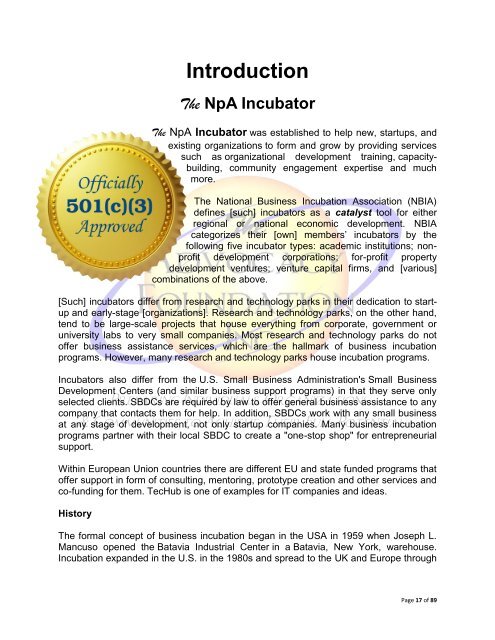The Nonprofit Incubator
The Nonprofit Incubator
The Nonprofit Incubator
Create successful ePaper yourself
Turn your PDF publications into a flip-book with our unique Google optimized e-Paper software.
Introduction<br />
<strong>The</strong> NpA <strong>Incubator</strong><br />
<strong>The</strong> NpA <strong>Incubator</strong> was established to help new, startups, and<br />
existing organizations to form and grow by providing services<br />
such as organizational development training, capacitybuilding,<br />
community engagement expertise and much<br />
more.<br />
<strong>The</strong> National Business Incubation Association (NBIA)<br />
defines [such] incubators as a catalyst tool for either<br />
regional or national economic development. NBIA<br />
categorizes their [own] members’ incubators by the<br />
following five incubator types: academic institutions; nonprofit<br />
development corporations; for-profit property<br />
development ventures; venture capital firms, and [various]<br />
combinations of the above.<br />
[Such] incubators differ from research and technology parks in their dedication to startup<br />
and early-stage [organizations]. Research and technology parks, on the other hand,<br />
tend to be large-scale projects that house everything from corporate, government or<br />
university labs to very small companies. Most research and technology parks do not<br />
offer business assistance services, which are the hallmark of business incubation<br />
programs. However, many research and technology parks house incubation programs.<br />
<strong>Incubator</strong>s also differ from the U.S. Small Business Administration's Small Business<br />
Development Centers (and similar business support programs) in that they serve only<br />
selected clients. SBDCs are required by law to offer general business assistance to any<br />
company that contacts them for help. In addition, SBDCs work with any small business<br />
at any stage of development, not only startup companies. Many business incubation<br />
programs partner with their local SBDC to create a "one-stop shop" for entrepreneurial<br />
support.<br />
Within European Union countries there are different EU and state funded programs that<br />
offer support in form of consulting, mentoring, prototype creation and other services and<br />
co-funding for them. TecHub is one of examples for IT companies and ideas.<br />
History<br />
<strong>The</strong> formal concept of business incubation began in the USA in 1959 when Joseph L.<br />
Mancuso opened the Batavia Industrial Center in a Batavia, New York, warehouse.<br />
Incubation expanded in the U.S. in the 1980s and spread to the UK and Europe through<br />
Page 17 of 89

















